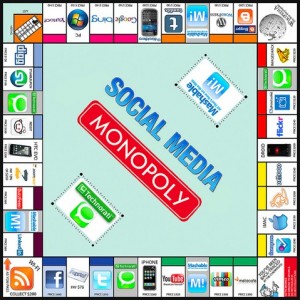Is Google a Monopoly? EC Launches Investigation
by Steve O'Keefe on December 2, 2010
 We monitor technology trends on this blog. One of the biggest tech trends of late is accusing Google of having a monopoly, or monopolies (plural), which begs the question of what, exactly, Google has a monopoly over? Most of the accusations center around search.
We monitor technology trends on this blog. One of the biggest tech trends of late is accusing Google of having a monopoly, or monopolies (plural), which begs the question of what, exactly, Google has a monopoly over? Most of the accusations center around search.
“Google ‘owns’ search,” says Columbia Law Professor, Tim Wu, in a November 13 piece for The Wall Street Journal‘s WSJ “Review” section. Wu’s new book, The Master Switch, is sounding the “Google as monopoly” bell which rang loudly before the U.S. Presidential elections in 2008 but has quieted down since.
Wu’s definition of “ownership” is quite a bit looser than a pure monopoly. Google “owns” less than two-thirds of the search market, according to ComScore. In June of this year, Google held 62.6% of search queries; Yahoo held 18.9%; and Microsoft’s Bing has grown to an impressive 12.7%. Having a dominant position in a field with few barriers to entry is not a monopoly. Just ask MySpace.
Two days ago, however, the accusations that Google has a monopoly moved from the rhetoric to real threat as the European Commission opened an investigation into whether Google has abused its position as the dominant search engine by intentionally skewing search results to benefit entities it owns. From the EC’s press release announcing inquiry launch:
The Commission will investigate whether Google has abused a dominant market position in online search by allegedly lowering the ranking of unpaid search results of competing services which are specialised in providing users with specific online content such as price comparisons (so-called vertical search services) and by according preferential placement to the results of its own vertical search services in order to shut out competing services. The Commission will also look into allegations that Google lowered the ‘Quality Score’ for sponsored links of competing vertical search services. The Quality Score is one of the factors that determine the price paid to Google by advertisers.
The argument here is not that Google is a monopoly because of its size. Rather, that Google has used illegal means to penalize competitors, which is what eventually gets so-called monopolies in trouble. I have long suspected that Google Blog Search favors blogs on the Google-owned Blogger/BlogSpot platform over rival WordPress. The EC review is based on favoring Google’s price comparison results over rival Foundem.
Two Google vice presidents have posted a response to the EC’s announcement on the Google Public Policy Blog, but they do not dispute the EC’s claim of favoritism. It was Microsoft’s exclusionary sales contracts that required PC makers to install its operating system and not competing software that got the software maker into antitrust trouble, not its market share.
As long as consumers have access to alternatives, does Google really have a monopoly on search? Does Facebook have a monopoly on social networking? The same could have been said of MySpace three years ago. MySpace has suffered hundreds of millions of dollars in losses for owner News Corp. Facebook could fade just as fast and, believe it or not, so could Google. In a previous post on this blog, we cited Morgan Stanley’s Mary Meeker as noting that seven of the top 15 Internet companies by market capitalization in 2004 are not in the top 15 today.
The primary reason for the demise of [Fortune 100] companies has been a failure to recognize and react to changing trends.
Those words come from the new book, MINITRENDS, by futurist John Vanston with Carrie Vanston. One of the main reasons the Vanstons wrote this book was to give large companies a formula for staying innovative. It’s easy for entrepreneurs to pioneer new ideas, and often much harder for those ideas to come from within giant organizations. But it can be done, and MINITRENDS provides a process these giants can use to identify and develop new methods and markets.
It has been Microsoft’s argument against the antitrust regulators that, absent criminal barriers to entry, its businesses are open to competition and subject to decline unless Microsoft continually innovates. Bill Gates, who is no stranger to the issues now facing Google, lashed out at Matt Ridley, author of the new book, The Rational Optimist, in last weekend’s WSJ Review:
Like many other authors who write about innovation, Mr. Ridley suggests that all innovation comes from new companies, with no contribution from established companies. As you might expect, I disagree with this view.
Gates knows that Facebook’s advertising network could upend Google’s fragile hold over the online advertising market, and that Facebook itself could fade as fast as MySpace did in a matter of a few years. For those companies who hope to stay ahead of the game, as Apple and Microsoft have consistently done, MINITRENDS provides a way of nurturing innovation — a process that itself is a significant innovation — in the quest to remain competitive.
STEVE O’KEEFE
News Editor, Minitrends Blog
Source: “In the Grip of the New Monopolists,” The Wall Street Journal, 11/13/10
Source: “Search engine Bing gains market share,” BBC Technology News, 07/14/10
Source: “Antitrust: Commission probes allegations of antitrust violations by Google,” EUROPA Press Releases, 11/30/10
Source: “MySpace losses lead way down for News Corp.,” Los Angeles Times, 08/05/09
Source: MINITRENDS: How Innovators & Entrepreneurs Discover & Profit From Business & Technology Trends, Technology Futures, Inc., p. 13.
Source: “Africa Needs Aid, Not Flawed Theories,” The Wall Street Journal, 11/27/10
Image by cambodia4kidsorg, used under its Creative Commons license.
Comments
Got something to say?













